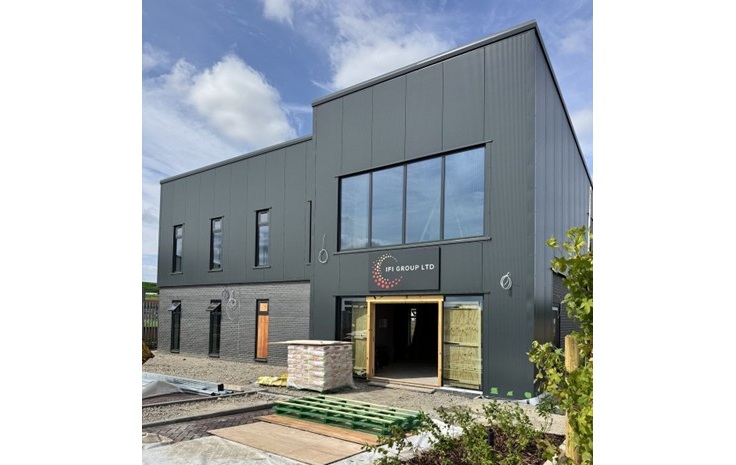Local commuters welcome upgrades to Castle Line
Estate agency relocates in Nottingham’s historic Lace Market
Business Gateway Growth Hub partners with Government to boost access to support for local businesses
Build Manager nears completion on bespoke office development for fire safety group
Cyber skills shortage threatens UK businesses’ digital security
The UK’s cybersecurity workforce is dangerously under-resourced, leaving businesses vulnerable to increasing cyber threats. As the digital economy grows, a mismatch between the country’s training systems and the demands of modern cybersecurity is becoming more evident. Industry experts are warning that outdated education frameworks are ill-equipped to prepare professionals for the sophisticated challenges posed by today’s cyber risks.
A new white paper calls for urgent reform to address the severe shortage of skilled professionals in the sector. It highlights that the UK’s fragmented training systems and lack of coordinated approach are major barriers to securing a robust cybersecurity workforce. As cyber threats escalate, particularly among small and medium-sized enterprises (SMEs), the country faces a growing gap in the talent required to protect its digital infrastructure.
The government is being urged to take immediate action to overhaul the cybersecurity skills pipeline. Key recommendations include the establishment of a comprehensive cybersecurity skills taxonomy, which would offer clarity around role definitions and career pathways. This would not only provide a consistent approach to recruitment and training but also ensure a better alignment between the skills required by businesses and the qualifications offered by educational institutions.
Experts stress that a cohesive national strategy is needed to create a sustainable, inclusive workforce. Without such a framework, the UK risks compromising its position as a leader in the global digital economy, with businesses left exposed to more frequent and severe cyber attacks.
Government’s Small Business Strategy offers positive steps, but further support is needed
The government’s new Small Business Strategy introduces several initiatives aimed at alleviating the challenges faced by small businesses, though further support is needed to address rising costs.
The strategy focuses on addressing late payments by introducing stricter payment terms, mandatory interest on overdue invoices, and penalties for companies with chronic late payment issues. It also promises to boost access to finance with a £3bn increase to the British Business Bank and the provision of 69,000 start-up loans. There is an emphasis on supporting exports with an additional £20bn capacity for UK Export Finance.
A new Business Growth Service is being introduced to help companies access essential support and advice, while regulatory burdens will be reduced with a 25% cut in administrative costs. Further investment in skills development has been allocated, including £1.2bn annually to fund digital skills development and “digital adoption pilots” for businesses. The strategy also outlines the modernisation of tax and customs processes through the use of AI tools to reduce errors. Planning rules for smaller sites will also be simplified to assist business growth.
The East Midlands Chamber has welcomed these measures but urged the government to tackle ongoing challenges, including inflation and staffing costs, which continue to affect small businesses. A recent Chamber survey found that nearly a third of East Midlands firms have faced worsened cash flow, highlighting the importance of the new focus on late payments.
However, ongoing issues like a skills shortage and high inflation need addressing to fully unlock business growth potential. Many businesses are also concerned about the impact of corporate taxes and rising costs. As part of their call to action, the Chamber urged that the government listen to the sector’s needs and ensure that policies do not inadvertently hinder growth.
Stagfield Group



RDCP acquires DJL Petfoods Ingredients to drive growth in pet food market
Investment firm RDCP has acquired DJL Petfoods Ingredients, a supplier of premium pet food ingredients and raw materials based in Nottingham. The financial terms of the deal were not disclosed.
Founded in 2017 by Duncan Lancaster, DJL is positioned for growth under the new ownership, with plans to expand its product offerings and strengthen its sales capabilities. The company operates from a 40,000 sq ft facility and aims to enter new markets by diversifying its ingredients and products.
RDCP’s acquisition marks an increase in its enterprise value to £520m. The investment group intends to leverage DJL’s strong market position and long-standing customer relationships to support its next growth phase. Lancaster will continue as CEO, maintaining a shareholding in the business.
This acquisition is part of RDCP’s broader strategy to expand its consumer-facing investments and establish itself as one of the largest privately-owned investment groups in the UK.
Chocoberry accelerates UK expansion with 50-site target
Chocoberry, the Leicester-based dessert café chain, has reported a 53% increase in revenue for the first half of 2025. The company is actively pursuing rapid expansion, aiming to reach 50 locations across the UK by the end of 2026.
Founded in 2018, Chocoberry now operates 18 cafés in the UK and additional outlets in the UAE, Turkey, and Canada. Known for its innovative desserts and all-day brunch menu, the brand has attracted strong interest from franchisees, securing eight new franchise agreements this year alone.
The company’s recent growth includes new openings in Manchester, Peterborough, and Leytonstone, and the chain is focused on accelerating its presence across the UK. Chocoberry is also eyeing international expansion, with plans to scale to 100 global locations by 2028, targeting North America, Asia, and the GCC regions.
At the heart of its UK operations is a 5,000 sq ft bakery in Leicester, which supports the production of thousands of baked goods each week, underpinning the company’s growth strategy. As the brand builds momentum, it is actively seeking multi-site franchise partners to facilitate its ambitious growth plans.












